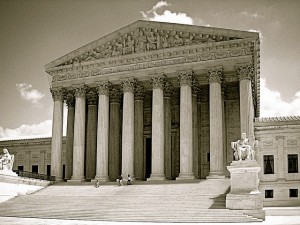SCOTUS decisions open thread
 This morning, the Supreme Court issued two decisions. In the case of Obamacare, contrary to long-standing precedent that requires courts first to look at the statute’s wording and then, if that is not helpful, to check out the legislative history that led to that wording (Gruber demonstrates the wording was intentional), Justice Roberts held that it was the Court’s responsibility to rubber-stamp the law. My take is that in so holding, the Supreme Court just rendered itself irrelevant. That is, if it’s no longer looking at the law under a constitutional rubric, but is simply following the legislative desire as stated at the time the Court rules, who needs it?
This morning, the Supreme Court issued two decisions. In the case of Obamacare, contrary to long-standing precedent that requires courts first to look at the statute’s wording and then, if that is not helpful, to check out the legislative history that led to that wording (Gruber demonstrates the wording was intentional), Justice Roberts held that it was the Court’s responsibility to rubber-stamp the law. My take is that in so holding, the Supreme Court just rendered itself irrelevant. That is, if it’s no longer looking at the law under a constitutional rubric, but is simply following the legislative desire as stated at the time the Court rules, who needs it?
Or as Justice Scalia says:
The Court’s decision reflects the philosophy that judges should endure whatever interpretive distortions it takes in order to correct a supposed flaw in the statutory machinery. That philosophy ignores the American people’s decision to give Congress ‘[a]ll legislative Powers’ enumerated in the Constitution. Art. I, §1. They made Congress, not this Court, responsible for both making laws and mending them. This Court holds only the judicial power — the power to pronounce the law as Congress has enacted it. We lack the prerogative to repair laws that do not work out in practice, just as the people lack the ability to throw us out of office if they dislike the solutions we concoct. We must always remember, therefore, that ‘[o]ur task is to apply the text, not to improve upon it.’ Pavelic & LeFlore v. Marvel Entertainment Group, Div. of Cadence Industries Corp., 493 U. S. 120, 126 (1989).
Trying to make its judge-empowering approach seem respectful of congressional authority, the Court asserts that its decision merely ensures that the Affordable Care Act operates the way Congress ‘meant [it] to operate.’ Ante, at 17. First of all, what makes the Court so sure that Congress ‘meant’ tax credits to be available everywhere? Our only evidence of what Congress meant comes from the terms of the law, and those terms show beyond all question that tax credits are available only on state Exchanges. More importantly, the Court forgets that ours is a government of laws and not of men. That means we are governed by the terms of our laws, not by the unenacted will of our lawmakers. ‘If Congress enacted into law something different from what it intended, then it should amend the statute to conform to its intent.’ Lamie, supra, at 542. In the meantime, this Court ‘has no roving license . . . to disregard clear language simply on the view that . . . Congress “must have intended” something broader.’ Bay Mills, 572 U. S., at ___ (slip op., at 11).
With regard to the FHA decision, which apparently says that disparate impact claims can be brought under FHA, I have less to say, because I’ve thought about it less. It strikes me, though, that it gives an activist FHA unlimited power to make up things as it goes along. That can’t be good.
